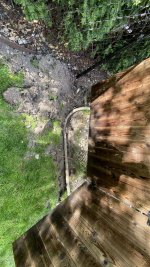- Jul 18, 2019
- 616
- Pool Size
- 33780
- Surface
- Vinyl
- Chlorine
- Salt Water Generator
- SWG Type
- Pentair Intellichlor IC-60
I am trying to open a can of worms here because I just can't understand this. If rigid PVC is so superior to flexible PVC (when both are schedule 40) why do half of the builders in my area use flex PVC? They're not fly by night builders either, these are reputable builders that have been doing it a long time. In my area the soil is all clay. Termites/insects aren't problem, but you never know what pests or an infestation might show up.
I get that rigid PVC is the superior product for it's durability and longevity. It seems this is the only one someone will actually recommend (people don't recommend flex apparently from what I can find). I can also see how having to do so many connections (if not properly or even improperly) could lend to potential leaks.
I get all the negative things I've seen about flexible PVC: potential insect/termite damage, potential crushing from compaction/backfill/cement/soil weight, etc., and how the ridges on the inside of the pipe can affect flow, and sharp rocks/objects can damage it. I also get how using as much continuous pipe as possible eliminates potential leak points and while you never want the ground to move, flex PVC is probably better than rigid if it does.
Can some of the pros on this site help answer this question for me once and for all? This is the last hold up for me to get started on my pool build here in 2021!
I get that rigid PVC is the superior product for it's durability and longevity. It seems this is the only one someone will actually recommend (people don't recommend flex apparently from what I can find). I can also see how having to do so many connections (if not properly or even improperly) could lend to potential leaks.
I get all the negative things I've seen about flexible PVC: potential insect/termite damage, potential crushing from compaction/backfill/cement/soil weight, etc., and how the ridges on the inside of the pipe can affect flow, and sharp rocks/objects can damage it. I also get how using as much continuous pipe as possible eliminates potential leak points and while you never want the ground to move, flex PVC is probably better than rigid if it does.
Can some of the pros on this site help answer this question for me once and for all? This is the last hold up for me to get started on my pool build here in 2021!


